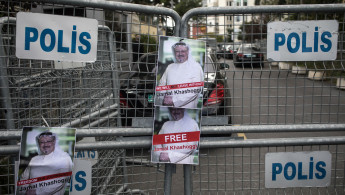UN 'paralysis' delaying justice for Khashoggi murder: expert
UN "paralysis" has prevented accountability for the brutal murder of Saudi journalist Jamal Khashoggi and the world body needs a new task force to ensure justice for such targeted killings, a rights expert said on Wednesday.
UN special rapporteur on extrajudicial, summary or arbitrary executions, Agnes Callamard, urged the United Nations to strengthen its role in countering suspected assassinations of journalists and dissidents.
She urged the UN to put in place "mechanisms" to protect journalists, rapidly react to threats against them, investigate suspected cases of targeted disappearances or killings, and help prepare the legal files for prosecution.
Callamard made the recommendations before the UN Human Rights Council in Geneva as she presented her damning report on the murder of Khashoggi, a Washington Post contributor and critic of Saudi Crown Prince Mohammed, who was at the Saudi consulate in Istanbul on October 2.
"The evidence gathered by the inquiry suggests that the killing of Mr. Khashoggi constituted an extrajudicial execution, an enforced disappearance and possibly an act of torture for which the state of the kingdom of Saudi Arabia is responsible," she told the council.
"The inquiry has found credible evidence, warranting further investigation, of high-level Saudi officials' liability, including that of the crown prince of Saudi Arabia," she said.
'Prejudice'
Saudi Arabia's envoy to the UN in Geneva, Abdulaziz Alwasil, slammed Callamard's report, charging that it relied on "prejudice and prefabricated ideas", while accusing her of exceeding her mandate.
Callamard is an independent human rights expert who does not speak for the UN but who reports her findings to it.
She stressed that her report was a human rights inquiry and not a criminal investigation.
Callamard said she had been spurred to investigate Khashoggi's death "by what I perceived to be the paralysis of the United Nations."
In her report, she questioned the credibility of a Saudi investigation into the case and argued that Khashoggi's killing fell under "universal jurisdiction".
She called on the UN Secretary-General Antonio Guterres to initiate an international criminal probe, but acknowledged Wednesday that his doing so required a demand from "one member state".
So far, no country has taken that step.
"If the international community ignores a targeted killing designed to silence peaceful expression of independence of mind, it puts at risk the protections on which all human rights depend," Callamard warned the council.
Specifically, she called for a rapid-intervention task force to probe specific cases, help national authorities with their investigations, and also help identify which international actors are responsible for ensuring the protection of threatened journalists.
She also urged the creation of a separate "permanent instrument" to investigate allegations of targeted killings or disappearances and prepare files for use in court.
Several countries at the council voiced interest in her proposal, but questioned how the task force could be implemented.
Ethical responsibility
On Tuesday, the Turkish fiancee of the murdered Saudi journalist insisted in an emotional interview that Washington has the ethical responsibility to initiate an international investigation into his killing.
Speaking to AFP on the sidelines of the UN Human Rights Council in Geneva, the 36-year-old Turkish scholar described her growing desperation as she stood outside the consulate and waited in vain for her fiance to emerge.
"At the beginning, I thought maybe something bad had happened to him, but I never thought the really far end of the picture," she said, speaking through an interpreter.
She said she suspected that Khashoggi - a harsh critic of Saudi Crown Prince Mohammed bin Salman - was experiencing some of the things he had feared.
"Maybe he was arrested inside, maybe they were interrogating him," she said. "I never (considered) the possibility of a murder."
With tears flowing down her cheeks and dripping into her silk hijab, she said she clung for months to the hope that the man she had planned to marry, and whose body has not been found, "might be alive".
But, she said, she had come to accept the truth: "He was violently murdered and massacred."
Cengiz told AFP it was obvious that the country her fiance had called home had a duty to help ensure accountability for his murder.
"Politically and ethically the USA is the country that is (responsible) for requiring an international investigation," she said, lamenting Washington's muted response so far.
She slammed US President Donald Trump and Secretary of State Mike Pompeo for approaching the issue in a "hazy way", and for preferring lucrative Saudi business relations over justice.
"This attitude of the USA is highly dangerous," she said, adding that it "sets a bad example to the rest of the world".
"I believe Saudi Arabia should pay for this and for its actions and suspects should be sentenced. Otherwise we will all be living in a world where (only) money talks."
Cengiz meanwhile lauded Turkey for acting "like a flagship in creating awareness regarding the murder of Khashoggi", but said it was unfair to expect Ankara to lead calls for an international investigation.
"I think Turkey is rightfully expecting other more powerful countries to take the lead in this matter," she said.
"Jamal didn't actually live in Turkey," she noted, adding that he could have settled in her home country, where he had good ties, "but he preferred the US (because) he trusted the political system there."
Riyadh initially said it had no knowledge of Khashoggi's fate, but later blamed the murder on rogue agents, and Saudi prosecutors have absolved the crown prince of responsibility.
Follow us on Twitter: @The_NewArab





 Follow the Middle East's top stories in English at The New Arab on Google News
Follow the Middle East's top stories in English at The New Arab on Google News
![Netanyahu furiously denounced the ICC [Getty]](/sites/default/files/styles/image_330x185/public/2024-11/GettyImages-2169352575.jpg?h=199d8c1f&itok=-vRiruf5)
![Both Hamas and the Palestinian Authority welcomed the ICC arrest warrants [Getty]](/sites/default/files/styles/image_330x185/public/2024-11/GettyImages-2178351173.jpg?h=199d8c1f&itok=TV858iVg)
